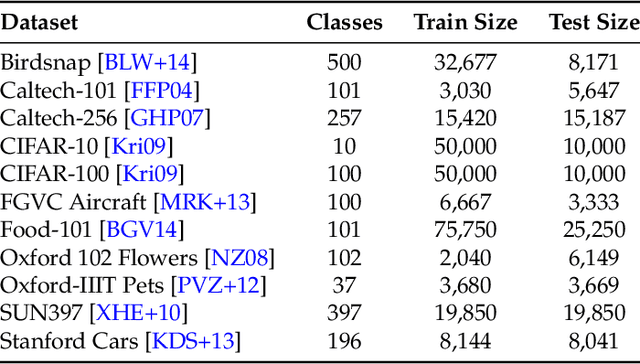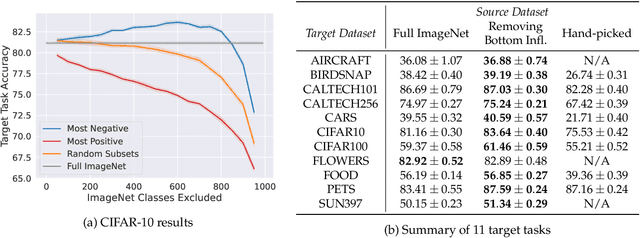Eric Wong
Comparing Styles across Languages
Oct 11, 2023



Abstract:Understanding how styles differ across languages is advantageous for training both humans and computers to generate culturally appropriate text. We introduce an explanation framework to extract stylistic differences from multilingual LMs and compare styles across languages. Our framework (1) generates comprehensive style lexica in any language and (2) consolidates feature importances from LMs into comparable lexical categories. We apply this framework to compare politeness, creating the first holistic multilingual politeness dataset and exploring how politeness varies across four languages. Our approach enables an effective evaluation of how distinct linguistic categories contribute to stylistic variations and provides interpretable insights into how people communicate differently around the world.
MDB: Interactively Querying Datasets and Models
Aug 13, 2023Abstract:As models are trained and deployed, developers need to be able to systematically debug errors that emerge in the machine learning pipeline. We present MDB, a debugging framework for interactively querying datasets and models. MDB integrates functional programming with relational algebra to build expressive queries over a database of datasets and model predictions. Queries are reusable and easily modified, enabling debuggers to rapidly iterate and refine queries to discover and characterize errors and model behaviors. We evaluate MDB on object detection, bias discovery, image classification, and data imputation tasks across self-driving videos, large language models, and medical records. Our experiments show that MDB enables up to 10x faster and 40\% shorter queries than other baselines. In a user study, we find developers can successfully construct complex queries that describe errors of machine learning models.
Stability Guarantees for Feature Attributions with Multiplicative Smoothing
Jul 12, 2023



Abstract:Explanation methods for machine learning models tend to not provide any formal guarantees and may not reflect the underlying decision-making process. In this work, we analyze stability as a property for reliable feature attribution methods. We prove that relaxed variants of stability are guaranteed if the model is sufficiently Lipschitz with respect to the masking of features. To achieve such a model, we develop a smoothing method called Multiplicative Smoothing (MuS). We show that MuS overcomes theoretical limitations of standard smoothing techniques and can be integrated with any classifier and feature attribution method. We evaluate MuS on vision and language models with a variety of feature attribution methods, such as LIME and SHAP, and demonstrate that MuS endows feature attributions with non-trivial stability guarantees.
TopEx: Topic-based Explanations for Model Comparison
Jun 02, 2023Abstract:Meaningfully comparing language models is challenging with current explanation methods. Current explanations are overwhelming for humans due to large vocabularies or incomparable across models. We present TopEx, an explanation method that enables a level playing field for comparing language models via model-agnostic topics. We demonstrate how TopEx can identify similarities and differences between DistilRoBERTa and GPT-2 on a variety of NLP tasks.
Rectifying Group Irregularities in Explanations for Distribution Shift
May 25, 2023Abstract:It is well-known that real-world changes constituting distribution shift adversely affect model performance. How to characterize those changes in an interpretable manner is poorly understood. Existing techniques to address this problem take the form of shift explanations that elucidate how to map samples from the original distribution toward the shifted one by reducing the disparity between these two distributions. However, these methods can introduce group irregularities, leading to explanations that are less feasible and robust. To address these issues, we propose Group-aware Shift Explanations (GSE), a method that produces interpretable explanations by leveraging worst-group optimization to rectify group irregularities. We demonstrate how GSE not only maintains group structures, such as demographic and hierarchical subpopulations, but also enhances feasibility and robustness in the resulting explanations in a wide range of tabular, language, and image settings.
Do Machine Learning Models Learn Common Sense?
Mar 02, 2023



Abstract:Machine learning models can make basic errors that are easily hidden within vast amounts of data. Such errors often run counter to human intuition referred to as "common sense". We thereby seek to characterize common sense for data-driven models, and quantify the extent to which a model has learned common sense. We propose a framework that integrates logic-based methods with statistical inference to derive common sense rules from a model's training data without supervision. We further show how to adapt models at test-time to reduce common sense rule violations and produce more coherent predictions. We evaluate our framework on datasets and models for three different domains. It generates around 250 to 300k rules over these datasets, and uncovers 1.5k to 26k violations of those rules by state-of-the-art models for the respective datasets. Test-time adaptation reduces these violations by up to 38% without impacting overall model accuracy.
In-context Example Selection with Influences
Feb 21, 2023



Abstract:In-context learning (ICL) is a powerful paradigm emerged from large language models (LLMs). Despite its promises, ICL performance is known to be highly sensitive to input examples. In this work, we use in-context influences to analyze few-shot ICL performance directly from the in-context examples. Our proposed influence-based example selection method outperforms most baselines when evaluated on 10 SuperGlue tasks and stably scales with increasing k-shot. The analysis finds up to a 22.2% performance gap between the most positively and negatively influential examples. In a case study, we apply our influence-based framework to quantify the phenomena of recency bias in example ordering for few-shot ICL.
Adversarial Prompting for Black Box Foundation Models
Feb 08, 2023Abstract:Prompting interfaces allow users to quickly adjust the output of generative models in both vision and language. However, small changes and design choices in the prompt can lead to significant differences in the output. In this work, we develop a black-box framework for generating adversarial prompts for unstructured image and text generation. These prompts, which can be standalone or prepended to benign prompts, induce specific behaviors into the generative process, such as generating images of a particular object or biasing the frequency of specific letters in the generated text.
Faithful Chain-of-Thought Reasoning
Feb 01, 2023



Abstract:While Chain-of-Thought (CoT) prompting boosts Language Models' (LM) performance on a gamut of complex reasoning tasks, the generated reasoning chain does not necessarily reflect how the model arrives at the answer (aka. faithfulness). We propose Faithful CoT, a faithful-by-construction framework that decomposes a reasoning task into two stages: Translation (Natural Language query $\rightarrow$ symbolic reasoning chain) and Problem Solving (reasoning chain $\rightarrow$ answer), using an LM and a deterministic solver respectively. We demonstrate the efficacy of our approach on 10 reasoning datasets from 4 diverse domains. It outperforms traditional CoT prompting on 9 out of the 10 datasets, with an average accuracy gain of 4.4 on Math Word Problems, 1.9 on Planning, 4.0 on Multi-hop Question Answering (QA), and 18.1 on Logical Inference, under greedy decoding. Together with self-consistency decoding, we achieve new state-of-the-art few-shot performance on 7 out of the 10 datasets, showing a strong synergy between faithfulness and accuracy.
A Data-Based Perspective on Transfer Learning
Jul 12, 2022



Abstract:It is commonly believed that in transfer learning including more pre-training data translates into better performance. However, recent evidence suggests that removing data from the source dataset can actually help too. In this work, we take a closer look at the role of the source dataset's composition in transfer learning and present a framework for probing its impact on downstream performance. Our framework gives rise to new capabilities such as pinpointing transfer learning brittleness as well as detecting pathologies such as data-leakage and the presence of misleading examples in the source dataset. In particular, we demonstrate that removing detrimental datapoints identified by our framework improves transfer learning performance from ImageNet on a variety of target tasks. Code is available at https://github.com/MadryLab/data-transfer
 Add to Chrome
Add to Chrome Add to Firefox
Add to Firefox Add to Edge
Add to Edge